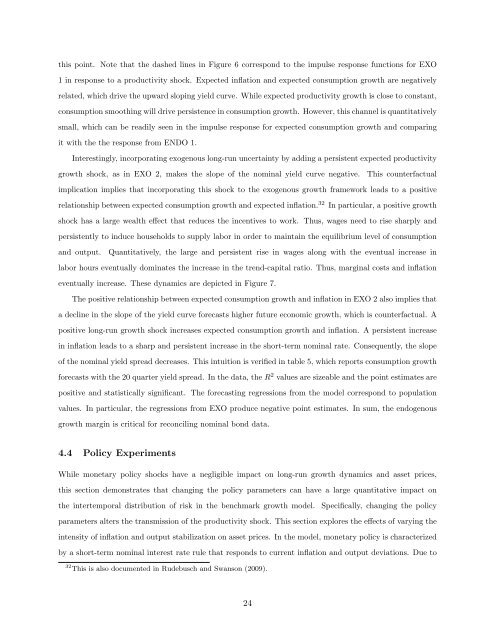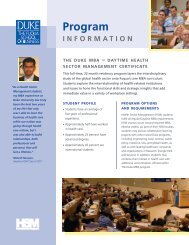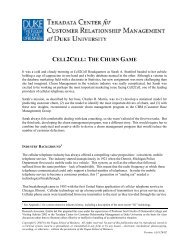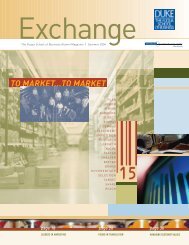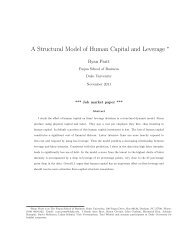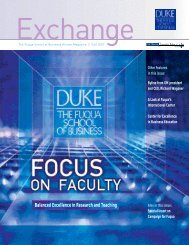Equilibrium Growth, Inflation, and Bond Yields - Duke University's ...
Equilibrium Growth, Inflation, and Bond Yields - Duke University's ...
Equilibrium Growth, Inflation, and Bond Yields - Duke University's ...
Create successful ePaper yourself
Turn your PDF publications into a flip-book with our unique Google optimized e-Paper software.
this point. Note that the dashed lines in Figure 6 correspond to the impulse response functions for EXO<br />
1 in response to a productivity shock. Expected inflation <strong>and</strong> expected consumption growth are negatively<br />
related, which drive the upward sloping yield curve. While expected productivity growth is close to constant,<br />
consumption smoothing will drive persistence in consumption growth. However, this channel is quantitatively<br />
small, which can be readily seen in the impulse response for expected consumption growth <strong>and</strong> comparing<br />
it with the the response from ENDO 1.<br />
Interestingly, incorporating exogenous long-run uncertainty by adding a persistent expected productivity<br />
growth shock, as in EXO 2, makes the slope of the nominal yield curve negative. This counterfactual<br />
implication implies that incorporating this shock to the exogenous growth framework leads to a positive<br />
relationship between expected consumption growth <strong>and</strong> expected inflation. 32 In particular, a positive growth<br />
shock has a large wealth effect that reduces the incentives to work. Thus, wages need to rise sharply <strong>and</strong><br />
persistently to induce households to supply labor in order to maintain the equilibrium level of consumption<br />
<strong>and</strong> output. Quantitatively, the large <strong>and</strong> persistent rise in wages along with the eventual increase in<br />
labor hours eventually dominates the increase in the trend-capital ratio. Thus, marginal costs <strong>and</strong> inflation<br />
eventually increase. These dynamics are depicted in Figure 7.<br />
The positive relationship between expected consumption growth <strong>and</strong> inflation in EXO 2 also implies that<br />
a decline in the slope of the yield curve forecasts higher future economic growth, which is counterfactual. A<br />
positive long-run growth shock increases expected consumption growth <strong>and</strong> inflation. A persistent increase<br />
in inflation leads to a sharp <strong>and</strong> persistent increase in the short-term nominal rate. Consequently, the slope<br />
of the nominal yield spread decreases. This intuition is verified in table 5, which reports consumption growth<br />
forecasts with the 20 quarter yield spread. In the data, the R 2 values are sizeable <strong>and</strong> the point estimates are<br />
positive <strong>and</strong> statistically significant. The forecasting regressions from the model correspond to population<br />
values. In particular, the regressions from EXO produce negative point estimates. In sum, the endogenous<br />
growth margin is critical for reconciling nominal bond data.<br />
4.4 Policy Experiments<br />
While monetary policy shocks have a negligible impact on long-run growth dynamics <strong>and</strong> asset prices,<br />
this section demonstrates that changing the policy parameters can have a large quantitative impact on<br />
the intertemporal distribution of risk in the benchmark growth model. Specifically, changing the policy<br />
parameters alters the transmission of the productivity shock. This section explores the effects of varying the<br />
intensity of inflation <strong>and</strong> output stabilization on asset prices. In the model, monetary policy is characterized<br />
by a short-term nominal interest rate rule that responds to current inflation <strong>and</strong> output deviations. Due to<br />
32 This is also documented in Rudebusch <strong>and</strong> Swanson (2009).<br />
24


